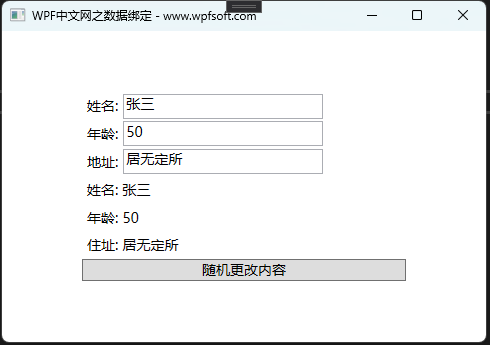INotifyPropertyChanged接口,通知客户端属性值已更改。
public interface INotifyPropertyChanged
{
event PropertyChangedEventHandler PropertyChanged;
}这个接口只有一个PropertyChanged事件,该事件专门用来触发属性更改通知。通常情况下,我们会单独编写一个服务类(例如ObservableObject),以实现INotifyPropertyChanged接口的业务。这样做的好处是,将来的ViewModel、Model都可以继承这个ObservableObject,从而调用属性通知接口。
一、实现INotifyPropertyChanged接口
public class ObservableObject : INotifyPropertyChanged
{
public event PropertyChangedEventHandler PropertyChanged;
public void RaisePropertyChanged([CallerMemberName] string propertyName = "")
{
PropertyChanged?.Invoke(this, new PropertyChangedEventArgs(propertyName));
}
}
使用了CallerMemberName特性后,就不必再传入属性名字符串。
接下来,我们来编写一个ViewModel和一个Model,让它们都继承这个属性通知基类。
Person实体
public class Person : ObservableObject
{
private string name;
public string Name
{
get { return name; }
set { name = value;RaisePropertyChanged(); }
}
private int age;
public int Age
{
get { return age; }
set { age = value; RaisePropertyChanged(); }
}
private string address;
public string Address
{
get { return address; }
set { address = value; RaisePropertyChanged(); }
}
}
MainViewModel实体
public class MainViewModel : ObservableObject
{
private Person person;
public Person Person
{
get { return person; }
set { person = value; RaisePropertyChanged(); }
}
public MainViewModel()
{
person = new Person
{
Name = "张三",
Age = 50,
Address = "居无定所",
};
}
}
我们修改了前面章节中的Person和MainViewModel两个类型,其中所有的属性都写成了完整的属性包装器形式,并在set语句块中增加了RaisePropertyChanged()方法成员的调用。
首先分析Person类,当修改Name、Age、Address属性时,调用RaisePropertyChanged(),此时如果前端UI有这几个属性的绑定,将会立即被更新内容。
然后是MainViewModel,这里的Person属性被重新赋值时,也将会通知到前端。如果MainViewModel中这个Person没有实现属性通知,那么,Person中的Name、Age、Address属性发生更改时,前端UI的内容会发生同步更新,但是,如果对Person属性本身重新赋值,前端UI是不会发生改变的。这一点细节需要了解清楚哦。
二、数据绑定示例
前端代码
<Window x:Class="HelloWorld.MainWindow"
xmlns="http://schemas.microsoft.com/winfx/2006/xaml/presentation"
xmlns:x="http://schemas.microsoft.com/winfx/2006/xaml"
xmlns:d="http://schemas.microsoft.com/expression/blend/2008"
xmlns:mc="http://schemas.openxmlformats.org/markup-compatibility/2006"
xmlns:local="clr-namespace:HelloWorld"
xmlns:forms="clr-namespace:System.Windows.Forms;assembly=System.Windows.Forms"
mc:Ignorable="d" FontSize="14"
Title="WPF中文网之数据绑定 - www.wpfsoft.com" Height="350" Width="500">
<StackPanel x:Name="panel" VerticalAlignment="Center" Margin="80,0">
<StackPanel Orientation="Horizontal">
<TextBlock Text="姓名:" Margin="5"/>
<TextBox Text="{Binding Person.Name,UpdateSourceTrigger=PropertyChanged}" Width="200" Height="25"/>
</StackPanel>
<StackPanel Orientation="Horizontal">
<TextBlock Text="年龄:" Margin="5"/>
<TextBox Text="{Binding Person.Age,UpdateSourceTrigger=LostFocus}" Width="200" Height="25"/>
</StackPanel>
<StackPanel Orientation="Horizontal">
<TextBlock Text="地址:" Margin="5"/>
<TextBox Text="{Binding Person.Address,UpdateSourceTrigger=Default}" Width="200" Height="25"/>
</StackPanel>
<TextBlock Margin="5" >
<Run Text="姓名:"/>
<Run Text="{Binding Person.Name}"/>
</TextBlock>
<TextBlock Margin="5" >
<Run Text="年龄:"/>
<Run Text="{Binding Person.Age}"/>
</TextBlock>
<TextBlock Margin="5" >
<Run Text="住址:"/>
<Run Text="{Binding Person.Address}"/>
</TextBlock>
<Button Content="随机更改内容" Click="Button_Click"/>
</StackPanel>
</Window>
后端代码
using System;
using System.Collections.Generic;
using System.ComponentModel;
using System.IO;
using System.Runtime.CompilerServices;
using System.Windows;
using System.Windows.Controls;
using System.Windows.Threading;
namespace HelloWorld
{
public class ObservableObject : INotifyPropertyChanged
{
public event PropertyChangedEventHandler PropertyChanged;
public void RaisePropertyChanged([CallerMemberName] string propertyName = "")
{
PropertyChanged?.Invoke(this, new PropertyChangedEventArgs(propertyName));
}
}
public class Person : ObservableObject
{
private string name;
public string Name
{
get { return name; }
set { name = value;RaisePropertyChanged(); }
}
private int age;
public int Age
{
get { return age; }
set { age = value; RaisePropertyChanged(); }
}
private string address;
public string Address
{
get { return address; }
set { address = value; RaisePropertyChanged(); }
}
}
public class MainViewModel : ObservableObject
{
private Person person;
public Person Person
{
get { return person; }
set { person = value; RaisePropertyChanged(); }
}
public MainViewModel()
{
person = new Person
{
Name = "张三",
Age = 50,
Address = "居无定所",
};
}
}
/// <summary>
/// MainWindow.xaml 的交互逻辑
/// </summary>
public partial class MainWindow : Window
{
public MainWindow()
{
InitializeComponent();
this.DataContext = new MainViewModel();
}
private void Button_Click(object sender, RoutedEventArgs e)
{
var vm = DataContext as MainViewModel;
if (vm == null) return;
vm.Person.Age = new Random().Next(1, 100);
vm.Person.Address = DateTime.Now.ToString();
}
}
}

在上面的例子中,我们在主窗体的构造函数中实例化了一个MainViewModel,并赋值给了DataContext。在前端代码中,我们分别用TextBlock和TextBox绑定了MainViewModel的Person对象。当在TextBox中改变内容时,可以看到下面的TextBlock的内容也会同步更新,注意UpdateSourceTrigger的不同用法。
在按钮的单击事件中,我们从DataContext属性中将MainViewModel取出来,并在后端修改了Person的Age和Address,与此同时,前端的显示也会同步更新。说明我们的属性通知起了作用。
除了INotifyPropertyChanged接口可以实现属性通知,还有一个接口也可以实现属性通知,它就是INotifyCollectionChanged。它的作用是:当添加和删除项或清除整个列表时,向侦听器通知动态更改。也就是说,它是专门来解决集合的元素数量发生变化时的通知问题的。我们在下一节来演示它的用法。
当前课程源码下载:(注明:本站所有源代码请按标题搜索)
文件名:053-《INotifyPropertyChanged接口》-源代码
链接:https://pan.baidu.com/s/1yu-q4tUtl0poLVgmcMfgBA
提取码:wpff
——重庆教主 2023年9月14日
若文章对您有帮助,可以激励一下我哦,祝您平安幸福!
| 微信 | 支付宝 |
|---|---|
 |
 |
 WPF中文网
WPF中文网